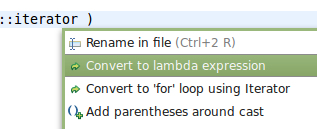When you start learning a new programming language you often encounter snippets of code which you have no idea why they work. The more you learn about that programming language to more you understand and these moments become rare.
Today, after programming many years in Java, I ran into such a situation with Java 8 and was really fascinated about it.
It all started with the problem of having a Stream<T> and wanting to “for-each” iterate over its content. The for-each construct in Java requires to have an array or Iterable<T>. However Stream<T> does only provide an Iterator<T>, which is not the same.
Now there are many solutions (good and bad) out there for this problem. However one solution really fascinated me:
Stream<String> s = …;
for (String v : (Iterable<String>) s::iterator) {
…
}
Now wait … Stream<T> does have a method iterator which returns an Iterator<T>. But Iterator<T> cannot be cast to Iterable<T>! And also is “s::iterator” not calling the method, but referencing the method.

Pasting this code fragment into the Eclipse IDE helps to understand what actually happens. Pressing Ctrl+1 on a code fragment allows to convert method references to lambda expressions and lambda expressions to anonymous classes. Quite fantastic ;-)
So, lets see how this code fragment get expanded to a lambda expression:
for ( final String v : (Iterable<String>)() -> s.iterator () ) {
…
}
And this lambda expression is equivalent to:
for ( final String v : new Iterable<String> () {
public Iterator<String> iterator () {
return s.iterator ();
}} ) {
…
}
The last snippet is rather bloated, as inner classes have always been in Java.
The magic which is happening is done by Java 8 new features “method references” and the “functional interfaces”. A functional interface is a java interface which only has one method to implement. “default” methods don’t count. Looking at Iterable<T> this is the case. So an Iterable<T> can be implemented with a lambda expression and or method reference. But for the for-each loop, Java does not “know” what you have mind. This is where the cast comes into play. By casting the method reference to Iterable<T>, Java infers that an Iterable<T> is requires, which can be provided by the method reference to Iterator<T>.
But looking at Iterable<T> there is no @FunctionalInterface present?!
That is right. But @FunctionalInterface is not a requirement for actually being a functional interface. It only tells the compiler to fail if the interface is not. So the downside of this example is, that there is no guarantee that Iterable<T> will always stay a functional interface, since the authors have not committed to that using @FunctionalInterface.
In the end, I am not sure if this is a good solution for my original problem. But is still is a fascinating piece of code and a great idea indeed.